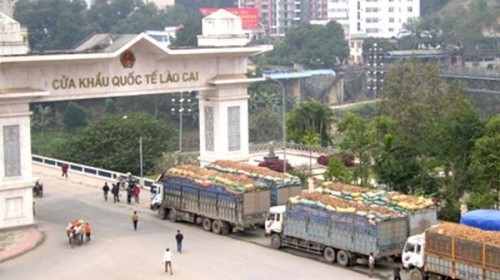
Most products exported to China via Lao Cai International Border Gate are agricultural items like cassava, fruits, rice and fine arts articles. (Photo: vietbao.vn)
(VOVworld) – Vietnam’s earnings from border trading in the first months of this year have been encouraging. At border crossings like Lao Cai International Border Gate, exports and imports of agro-forestry products have seen high growth.
Cargo checkers at Lao Cai International Border Gate have been busy since early morning checking to make sure thousands of tons of watermelon, dried fruits, and other types of agricultural products having been properly packaged and labeled. Required procedures for customs clearance began the previous day.
Phan Thi Hai of Lao Cai’s Hoai Huong Company which specializes in supplying watermelons to China, says Vietnam’s agricultural produce is preferred by Chinese partners, who set strict requirements for quality and product design.
She explains further: “they only accept products with high quality and eye-catching design. Unqualified items are returned immediately. China buys various kinds of products so it’s an advantage for Vietnamese enterprises. Despite price fluctuations, we are still doing business with Chinese partners.”
By the end of last month, Vietnam has earned 18 million USD from exporting agro-forestry products via Lao Cai International Border Gate, up 10% from the same period last year.
Vu Quang Vinh, Deputy Director of the Customs Division of Lao Cai International Border Crossing, says: “exported products at the gate are diverse. Some are locally produced, like cassava and banana, and other items like forestry products are from Yen Bai, Phu Tho, or fruits from southern provinces. Lao Cai authorities have promulgated many policies to create better conditions for businesses. For example, we have moved the cargo truck area to a new, bigger area nearer the gate.”
The recovery of the Chinese market, Vietnamese enterprises’ efforts to improve product quality, government policies, and Lao Cai Customs Department policies have also boosted export revenues of local border gates.
Nguyen Quyet Chien, Director of the Customs Division of Lao Cai International Border Crossing, says: “the department always creates favorable conditions for trading and investment activities in the province. Since we’ve applied the automated customs clearance system, the work has been faster and more transparent. Administrative reforms and the deployment of the system have received strong support from businesses.”